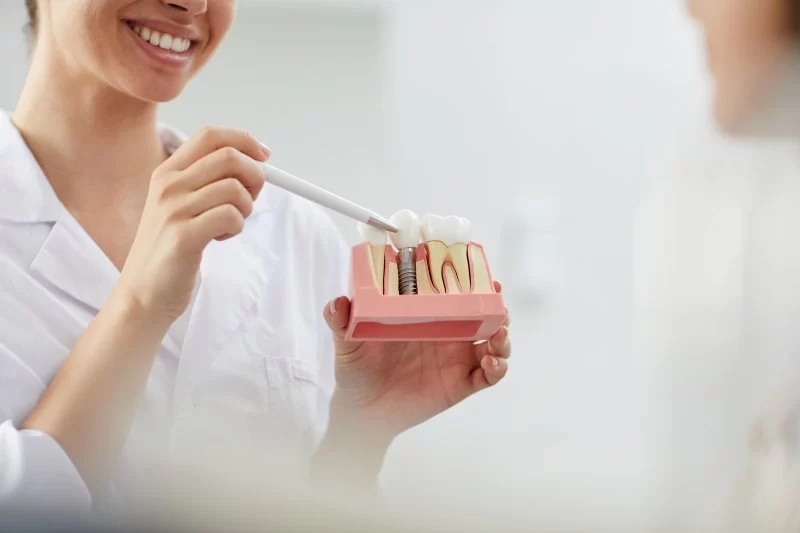
What to Expect During a Dental Consultation for Implants: A Complete Guide
If you’ve been considering dental implants, chances are you’ve already heard a lot about them. They offer a permanent solution to missing teeth, improve your smile, and boost your confidence. But like any major dental procedure, getting dental implants requires careful planning, and the first step in that process is the dental consultation. A dental consultation for implants is where everything begins – it’s where your dentist will assess your oral health, discuss your options, and help you decide if dental implants are the right solution for you. In this article, I’ll take you through everything you can expect during your dental consultation for implants. Whether you’re still debating whether to get implants or you’ve already made the decision, understanding what happens during the consultation can ease your mind and help you prepare for the journey ahead.
1. Initial Discussion: Understanding Your Needs and Concerns
The first part of any dental consultation for implants involves an open and honest conversation between you and your dentist. When I first visited my dentist for an implant consultation, I was nervous. I wasn’t sure what to expect or how the process worked. However, what I quickly realized is that the consultation is not just about examining your teeth – it’s about understanding your unique needs and concerns. During this conversation, the dentist will ask you a variety of questions to gather relevant information:
- Your medical history: The dentist will want to know about your overall health, any medical conditions, and medications you’re currently taking. This is because certain health issues, like diabetes or gum disease, can affect the success of dental implants.
- Your dental history: Your dentist will want to learn about your oral health, including any previous dental procedures you’ve had, any missing teeth, and your current oral hygiene habits. This will help them assess whether implants are a viable option for you.
- Why you’re interested in dental implants: The dentist will also ask why you want dental implants, and what your goals are for improving your smile. Whether it’s replacing a single tooth, multiple teeth, or enhancing the overall appearance of your teeth, your dentist will tailor the consultation based on your specific needs.
This conversation is an essential part of the process because it sets the foundation for your treatment plan. Don’t be afraid to ask your dentist any questions or voice any concerns you may have – I know I had a lot of them, but the more informed you are, the better decisions you can make for your oral health.
2. Comprehensive Examination: Assessing Your Oral Health
Once your dentist understands your needs, they’ll conduct a thorough examination of your mouth and jaw. This step is crucial for determining if you’re a suitable candidate for dental implants. When I went in for my consultation, the dentist spent a lot of time closely examining my gums, teeth, and jawbone. Here’s what to expect during this part of the consultation:
- Visual Exam: The dentist will check the overall health of your gums, teeth, and mouth. They will look for any signs of infection, disease, or abnormalities that may affect the success of the implants. The condition of your gums and jawbone is particularly important for dental implants, as these structures need to be healthy in order to properly support the implants.
- X-Rays and 3D Imaging: To get a better view of the structure of your jawbone, your dentist will likely take X-rays or 3D images. These images will help them determine the amount of bone available for the implant and whether there are any issues, like bone loss, that need to be addressed. In my case, I had some bone loss, so the dentist suggested a bone graft to ensure the implant would be secure.
- Evaluation of the Bite: Your dentist will also examine your bite to ensure that your new implants will align correctly with your existing teeth. This step helps in planning the exact placement of the implants.
During this part of the consultation, it’s not uncommon for the dentist to discuss additional procedures, such as bone grafting, sinus lifts, or gum treatments, depending on the condition of your oral structures. Don’t be alarmed if your dentist mentions any of these procedures – they are common steps to ensure a successful dental implant procedure.
3. Discussion of Treatment Plan and Timeline
After the examination, your dentist will discuss your personalized treatment plan in detail. This is where the real planning happens, and it’s important that you understand each step of the process. When I sat down with my dentist to discuss my treatment plan, I appreciated that they explained everything clearly, from the surgical procedure to the healing process. Here’s what you can expect:
- Treatment Options: Depending on your situation, your dentist may present you with different options for dental implants. They might recommend different materials for the implants (e.g., titanium vs. ceramic) or suggest implant-supported bridges if you need to replace multiple teeth.
- Surgical Details: Your dentist will outline the entire process, including the surgery to place the implants, the healing period, and the time it will take for the implants to integrate with your jawbone (a process called osseointegration). They’ll also explain any potential risks or complications and how these will be managed.
- Timeline: The timeline for dental implants can vary based on the complexity of your case. In my case, the entire process took several months, but I was told that it’s not unusual for the full treatment to span six months to a year. This includes the healing period between implant placement and the attachment of the crown or bridge.
- Cost and Payment Options: The dentist will also discuss the cost of the procedure and whether insurance will cover any part of the treatment. In my case, insurance covered part of the cost, but I had to budget for additional expenses like bone grafts. Be sure to ask about financing options or payment plans if the cost is a concern.
It’s important to understand that dental implants are a long-term investment in your oral health, and the consultation is the perfect time to ask about any concerns regarding costs, recovery time, or potential complications.
4. Exploring Aftercare and Post-Surgery Instructions
Once the details of your treatment plan have been discussed, your dentist will provide information about aftercare and what to expect during recovery. It’s crucial to follow these instructions carefully to ensure the success of your implants. After my implant surgery, I was given a list of instructions that helped me recover smoothly. Some common aftercare tips include:
- Pain Management: The dentist will explain how to manage any discomfort following surgery. I was prescribed pain medication and was advised to use ice packs to reduce swelling.
- Oral Hygiene: Keeping your mouth clean after surgery is critical for preventing infection. My dentist gave me special instructions on how to brush and rinse with antiseptic mouthwash while avoiding the surgical site during the initial healing phase.
- Follow-up Appointments: Your dentist will schedule follow-up appointments to check the healing progress and make any necessary adjustments to the implants.
By following these aftercare guidelines, you can help ensure that your implants integrate properly and that your recovery goes smoothly. It’s also important to keep in touch with your dentist if you experience any complications during recovery, such as excessive pain or swelling.
In conclusion, a dental consultation for implants is a detailed process that covers everything from your medical history to post-surgery care. I remember feeling a bit overwhelmed at first, but once I understood what to expect, it was a lot easier to approach the procedure with confidence. If you’re considering dental implants and want to learn more about the process or get started with a consultation, I highly recommend visiting Dentistry Toothtruth for more information and to schedule your consultation.







 Ocean County Endodontics LLC: Mc Cafferty Ryan J DDS4.0 (8 review)
Ocean County Endodontics LLC: Mc Cafferty Ryan J DDS4.0 (8 review) ADVANCED SMILES PC4.0 (205 review)
ADVANCED SMILES PC4.0 (205 review) Emergnecy Dentist 24/7 Fontana0.0 (0 review)
Emergnecy Dentist 24/7 Fontana0.0 (0 review) Lake Forest Dental Associates4.0 (230 review)
Lake Forest Dental Associates4.0 (230 review) Dental Dreams - Cottman3.0 (1666 review)
Dental Dreams - Cottman3.0 (1666 review) Dr. Marvin R. Winter, DDS5.0 (9 review)
Dr. Marvin R. Winter, DDS5.0 (9 review) The Importance of Oral Health Education During Pregnancy for a Healthy Pregnancy
The Importance of Oral Health Education During Pregnancy for a Healthy Pregnancy Best Tips for Brushing Your Teeth Properly for Healthy Gums: Essential Techniques for Oral Health
Best Tips for Brushing Your Teeth Properly for Healthy Gums: Essential Techniques for Oral Health Why Skipping Dental Checkups Can Lead to Bigger Oral Health Problems
Why Skipping Dental Checkups Can Lead to Bigger Oral Health Problems Advantages of Porcelain Dental Restorations
Advantages of Porcelain Dental Restorations How Can Diabetes Cause Tooth and Gum Problems? Preventing and Managing Oral Health Issues
How Can Diabetes Cause Tooth and Gum Problems? Preventing and Managing Oral Health Issues Healthy Habits for Promoting Good Oral Health and Hygiene: Tips for a Healthy Smile
Healthy Habits for Promoting Good Oral Health and Hygiene: Tips for a Healthy Smile